Whether you’re struggling to produce enough milk, or you just want to add a vitamin boost to the milk you do produce, lactation supplements can be a great addition to your breastfeeding routine.
Choosing the right one depends on what your priorities are as well as what pre-existing conditions you might have. In this guide, we’ll go over what factors you need to consider, how to tell if you have a low milk supply, and talk about the 10 best lactation supplements to buy in 2026.
- What You Need to Know About Lactation Supplements
- Top 10 Best Lactation Supplements 2026
- 1. Best Overall Lactation Supplement: Pure Mom Organic Lactation Supplement
- 2. Best Supplement for Blocked Milk Ducts: Legendary Milk Sunflower Lecithin Soft Gel
- 3. Best Premium Lactation Supplement: Benevolent Nourishment Lactation Support Drops
- 4. Best Budget Lactation Supplement: UpSpring Milkflow Fenugreek Lactation Supplement
- 5. Best Drinkable Lactation Supplement: Earth Mama Organic Milkmaid Tea
- 6. Best Fenugreek-Free Lactation Supplement: Sweetbottoms Moringa for Milk Capsules
- 7. Best-Tasting Fenugreek Supplement: UpSpring Milkflow Lactation Supplement Drink Mix
- 8. Most Convenient Lactation Supplement: Boobie Bar Superfood Breastfeeding Bar
- 9. Most Delicious Lactation Supplement: Mommy Knows Best Lactation Cookie Mix
- 10. Milksta Organic & Vegan Nursing Coffee
- Frequently Asked Questions About Lactation Supplements
- Final Word
What You Need to Know About Lactation Supplements
In this section, we’ll look at the two main claims that lactation supplements make and the three main types of supplements you’ll find.
What Are the Benefits of Lactation Production?
Lactation supplements are any supplements that claim to help increase or otherwise improve milk production. Some also claim to improve the nutritional value of the milk you produce. Lactation supplements can come in a variety of forms. Most often, you’ll find them as capsules, drink mixes, or even in the form of baked goods.
Improve Milk Production
The main reason for taking lactation supplements is to help boost your milk supply. So supplements usually contain a galactagogue as its active ingredient. Despite sounding like a medieval monster, a galactagogue is just any ingredient that helps milk production.
The best galactagogues are safe, natural ingredients like fenugreek, moringa, fennel, or lecithin. You can read more about the most common herbal ingredients used in lactation supplements in our full buyer’s guide below.
Boost Nutritional Value of Breastmilk
In addition to galactagogues, lactation supplements often also include other ingredients to provide vitamins and minerals. This can increase the nutritional value of your breastmilk.
For the most part, supplements claiming to boost nutritional value will have to enrich the supplement with vitamins and minerals. Some supplements, like this Sweetbottoms Moringa, act as an all-in-one galactagogue and nutritional boost because the herb itself is loaded with vitamins, minerals, and amino acids.
What Types of Lactation Supplements Are There?
The three main types of lactation supplements are capsules, beverages, and cookies. Below, we’ll go over the main advantages and disadvantages of each type.
Capsule or Tablet
The benefit of something that you can swallow is that you can just take it and forget about it. With the drink mixes or cookies below, you typically have to consume multiple throughout the day.
A capsule can pack a full day’s dose in 1-2 pills that are easy to swallow and don’t add calories.
However, with certain ingredients, like fenugreek, the active compounds that help with lactation aren’t absorbed as well in pill form. A tea or tincture tends to do a better job of preserving the volatile oils where these active compounds are stored.
Beverage
A drinkable lactation supplement like this tea or this drink mix are both convenient and enjoyable.
They can also be the best delivery system for galactagogues, where the active compounds come in the form of volatile oils that might evaporate when dehydrated and added to a capsule or cookie mix.
However, it tends to take 2-3 servings to see any noticeable effect on milk production. This can make it a more expensive option since the number of servings that come in say, a box of tea bags, is much lower than the number of capsules you usually get or the number of cookies you can make with a single bag of lactation cookie mix.
Cookie or Other Baked Good
Most often, edible lactation supplements come in the form of a pre-made mix that you then bake into cookies or brownies. In some cases, they come as ready-made bars like these Boobie Bars.
It’s a tasty and fun way to increase milk supply and boost its nutritional value. It’s also a great excuse to eat cookies for breakfast!
In the list below, you’ll find a range of different types of lactation supplements and different active ingredients. Choose the one that best fits your lactation concerns.
Top 10 Best Lactation Supplements 2026
1. Best Overall Lactation Supplement: Pure Mom Organic Lactation Supplement
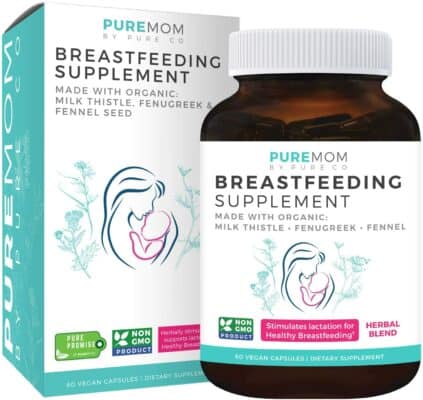
Editor’s Rating:
Quick Facts:
- Type: Capsule
- Main Ingredient: Fenugreek, Milk Thistle, Fennel
- Potential Side Effects: Contains Allergens
These capsules offer a great dosage of a potent blend of the best galactagogues available on the market. They’re organic, free of additives and preservatives, and safe to take while breastfeeding.
Ingredients
This capsule contains 400 mg of fenugreek, 300 mg of milk thistle, and 100 mg of fennel seed. The capsule itself is also plant-based and vegan-friendly. These are much higher doses than you typically see in capsule supplements.
That higher dose is beneficial because you do lose some absorption capability with the capsule format as compared to a liquid supplement. So the higher dose increases the odds of absorbing enough of the supplement to see the positive effects you’re looking for.
High doses of fenugreek can cause mild gastrointestinal distress in some people. If you notice these symptoms while taking this supplement, switch to a fenugreek-free alternative.
Potential allergens include milk thistle and fennel. For an allergen-free alternative, you might prefer this Moringa supplement.
How to Use It
The recommended dosage on the bottle is two per day. However, given the higher dosing, you can start with just one a day and see if that’s enough to get the results you want. If your milk production hasn’t noticeably increased after a week, up your dose to the recommended two a day.
We recommend this because limiting it to one capsule per day will stretch this bottle out for two months. That’s twice as long as if you took the recommended two per day dose.
If you do take two per day, take one in the morning and the other at night. This will minimize the risk of having an adverse reaction to the fenugreek.
Pros
- Potent blend of fenugreek, milk thistle, and fennel
- High dosage to increase absorption
- Convenient capsule form
- Organic and vegan-friendly ingredients
Cons
- Contains potential allergens
- Fenugreek may cause side effects
2. Best Supplement for Blocked Milk Ducts: Legendary Milk Sunflower Lecithin Soft Gel
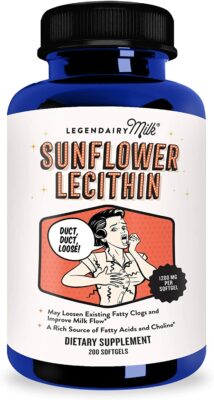
Editor’s Rating:
Quick Facts:
- Type: Capsule
- Main Ingredient: Lecithin
- Potential Side Effects: None
These sunflower lecithin soft gels are soy- and dairy-free. These are great for either treating existing clogs or maintaining consistent milk flow to prevent clogs. With 200 capsules in the bottle, it will last you up to three months before you have to refill your supply.
Ingredients
Lecithin helps reduce the stickiness of breastmilk, which is why it can help with blocked milk ducts. It dilutes the fatty acids in your milk, allowing it to flow more freely.
One perk of this sunflower-based lecithin is that it avoids any potential allergic reactions. Many supplements source lecithin from soy or egg yolks. For people with soy or egg allergies, that can be a problem. This supplement is safe and allergen-free.
How to Use It
You can take this is either as a treatment when you notice a block in your milk ducts or as a regular supplement to prevent blocks from happening in the first place.
While it is incredibly effective for treating and preventing clogs or blockage, it doesn’t technically increase milk supply. So if the problem isn’t clogging but a lack of milk, you should get a galactagogue formula like this fenugreek supplement.
Pros
- Highly effective for treating and preventing blocked milk ducts
- Does not contain soy or egg
- Improves milk flow
- 200 capsules per bottle
Cons
- Doesn’t treat low milk supply
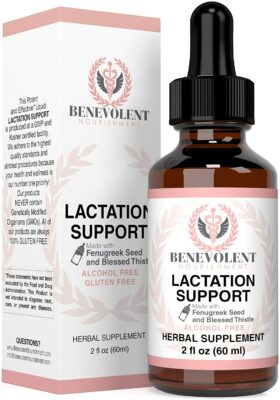
Editor’s Rating:
Quick Facts:
- Type: Tincture
- Main Ingredient: Fenugreek, Moringa, Blessed Thistle, Goat’s Rue
- Potential Side Effects: Gastrointestinal Discomfort, Potential Allergens
For a lactation supplement that’s easier to swallow than large capsules but just as convenient, you can’t beat this liquid supplement with a blend of fenugreek, blessed thistle, and goat’s rue.
Ingredients
This blend includes fenugreek, moringa, blessed thistle, and goat’s rue. All four are great galactagogues and, in combination, become even more potent than they are when taken separately. It’s tough to beat this blend in terms of efficiency and maximum results on increasing milk supply.
This concentrated liquid formula delivers the potent fenugreek and blessed thistle blend in a format that is more readily absorbed than standard capsules. So, it may seem like a smaller quantity for your money, but it boasts twice the absorption rate.
It won’t help with blocked milk ducts or improved expression of milk, but it will definitely help with increasing the amount that you produce.
For something that can help improve your ability to express milk as well, you might prefer Pure Mom which contains fennel specifically for that purpose.
Potential allergens included blessed thistle.
How to Use It
Start with one drop daily, beginning about one week after giving birth. See how your body responds to it for a full week. If you don’t feel your production has improved enough, you can increase the dose to drops daily. Take these doses separately.
You can add a drop to a glass of water or your evening cup of tea. The brand recommends taking this at night before bed.
Pros
- Highly absorbable tincture format
- Powerful blend of the most potent galactagogues
- Easy to use
Cons
- Mild risk of side effects
- Contains potential allergens
4. Best Budget Lactation Supplement: UpSpring Milkflow Fenugreek Lactation Supplement
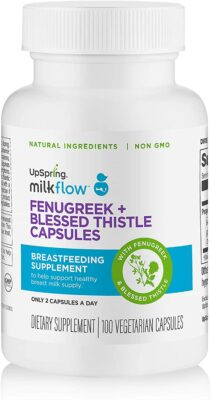
Editor’s Rating:
Quick Facts:
- Type: Capsule
- Main Ingredient: Fenugreek, Blessed Thistle
- Potential Side Effects: Gastrointestinal Discomfort, Potential Allergens
With 100 capsules per bottle, this will last you anywhere from 1-3 months, depending on how many doses you take per day. Since this contains a highly concentrated, potent form of fenugreek, we expect many mothers will be able to get good results with just one capsule a day.
Ingredients
This blend contains fenugreek, blessed thistle, and anise. Of these, fenugreek is the most potent galactagogue.
The dosing on the packaging is, admittedly, confusing. The label claims that the capsule contains 250 mg of their proprietary blend. Yet, the advertisements claim that each capsule contains 1800 mg of fenugreek alone.
The reason for this large discrepancy is that the fenugreek has been condensed into a highly concentrated powder form. So, by volume, the fenugreek is 180 mg out of the 250 mg. However, due to the highly concentrated form, it’s about 10 times as potent as normal fenugreek. 180 x 10 = 1800. Hence, the 1800 mg claim.
It’s a little confusing and perhaps a little misleading, but you are getting a much more potent form of fenugreek in this blend.
Fenugreek has been reported to cause mild nausea in mothers and bloating or diarrhea in babies in some cases. However, this doesn’t always happen. If you’ve never taken fenugreek before, just keep alert for the first month or so to see if side effects appear.
If they do, consider a fenugreek-free formula like this moringa coffee mix.
Potential allergens include milk thistle.
How to Use It
The bottle recommends taking 2-3 capsules throughout the day. However, you can start with just one to see if that’s enough to see the results you’re looking for.
If you’ve never taken a fenugreek supplement before, we highly recommend just starting with one a day for the first few weeks, just to make sure you don’t have an adverse reaction. After that, you can up your dose to the recommendation on the bottle if you feel it’s necessary.
Pros
- 100 capsules per bottle
- Fenugreek and blessed thistle blend provide great results
- Noticeable effects with smaller doses
Cons
- Mild risk of side effects
- Contains potential allergens
5. Best Drinkable Lactation Supplement: Earth Mama Organic Milkmaid Tea
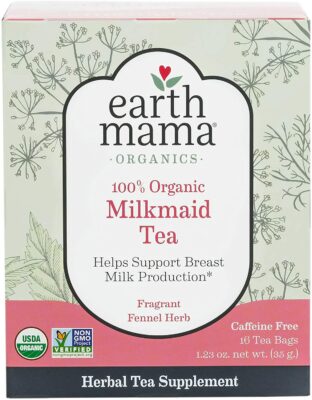
Editor’s Rating:
Quick Facts:
- Type: Beverage
- Main Ingredient: Fenugreek, Fennel, Milk Thistle
- Potential Side Effects: Gastrointestinal Discomfort, Potential Allergens
This pack of herbal tea bags is a convenient way to get a potent blend of galactagogues while also enjoying a soothing and aromatic cup of tea before bed.
Ingredients
This is a comforting blend that is made primarily of fenugreek with a dash of fennel and milk thistle for added lactation benefits. The blend also includes red raspberry and orange to provide a pleasant flavor.
Overall, this blend provides a strong dose of lactation supplements and other ingredients that add much-needed vitamins and antioxidants to your diet, which can improve the nutritional value of your milk.
The tea format also makes these ingredients more readily absorbable, making the galactagogues more effective.
As with other fenugreek formulas, there is some risk of gastrointestinal discomfort for either you or your baby. When you start drinking this tea, keep an eye out of these side effects. If you notice them, switch to a fenugreek-free supplement.
If you do notice side effects, this decaf coffee blended with moringa is a good alternative, providing a similarly soothing brew but without the fenugreek.
Potential allergens in this blend include fennel and milk thistle.
How to Use It
Drink 2-3 cups of milkmaid tea per day, beginning about a week after giving birth. There are no hard rules, but a good approach is to start at three cups per day, decreasing it gradually to one cup per day as your milk production increases.
You can drink this any time of day, but it’s usually suggested to drink at least one cup before bed.
Pros
- Ingredients are more readily absorbed
- Soothing, enjoyable beverage
- High in vitamins and antioxidants
Cons
- Requires multiple doses for best results
- Contains potential allergens
- Fenugreek may cause mild gastrointestinal discomfort
6. Best Fenugreek-Free Lactation Supplement: Sweetbottoms Moringa for Milk Capsules
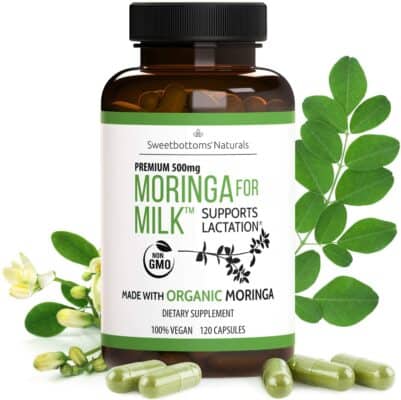
Editor’s Rating:
Quick Facts:
- Type: Capsule
- Main Ingredient: Moringa
- Potential Side Effects: None
Moringa is a great alternative to fenugreek, not only because it is comparable in terms of potency but also because it’s packed with vitamins and minerals. So this single herb doubles as a lactation supplement and nutritional supplement.
Ingredients
These capsules are filled with pure, non-GMO moringa leaves. There are no other additives or preservatives. It’s just the moringa leaves and the plant-based capsule it comes in.
The moringa does leave a mild, grassy after taste that some people don’t enjoy. This is a usual drawback with any herbal supplement. However, because of it, we recommend having a piece of fruit or another snack handy to get rid of the after taste after taking a dose.
How to Use It
The label suggests taking between 2-5 capsules throughout the day. We recommend starting at two and increasing gradually if you still aren’t noticing a difference after two weeks. It’s unlikely you will actually need to take a full five per day.
Split your doses up throughout the day. For example, once in the morning and then again before bed.
Pros
- No risk of side effects
- Naturally high in vitamins and minerals
- No potential allergens
- Comparable results to fenugreek
Cons
- Grassy after taste
7. Best-Tasting Fenugreek Supplement: UpSpring Milkflow Lactation Supplement Drink Mix
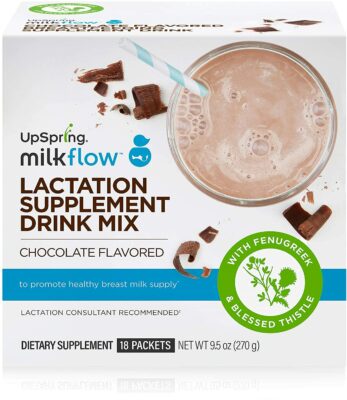
Editor’s Rating:
Quick Facts:
- Type: Beverage
- Main Ingredient: Fenugreek, Blessed Thistle, Lecithin
- Potential Side Effects: Gastrointestinal Discomfort, Potential Allergens
This is such an easy and flavorful way to get your daily dose of fenugreek and blessed thistle to increase milk production. The lecithin is an added bonus that prevents clogging in your milk ducts, so this is an all-in-one lactation supplement!
Ingredients
Fenugreek and blessed thistle act as powerful galactagogues, while the lecithin helps improve flow and prevent blockages in your milk ducts. Together, these ingredients help you produce more milk and express that milk more effectively.
Fenugreek can cause mild nausea, vomiting, and diarrhea. Keep an eye out for these side effects.
Potential allergens include blessed thistle, soy, and dairy.
How to Use It
To use, mix one packet with about 6-8 ounces of milk. Stir vigorously and enjoy. You can drink this hot or cold. You can also use yogurt instead of milk or add the powder to your smoothie.
This is a much more delicious way to get your daily lactation supplement than swallowing a pill.
However, you only get 18 packets in a box. That’s less than a month’s supply, even if you drink just one portion per day. Moreover, the eco-conscious parents out there won’t appreciate the single portion plastic packets. While convenient, they do generate a lot of waste.
Pros
- Much better flavor than plain fenugreek capsules
- Easy to make
- Fenugreek and milk thistle increase milk production
- Lecithin prevents blocked milk ducts
Cons
- Lots of packaging
- Contains potential allergens
- Small quantity of doses per box
8. Most Convenient Lactation Supplement: Boobie Bar Superfood Breastfeeding Bar
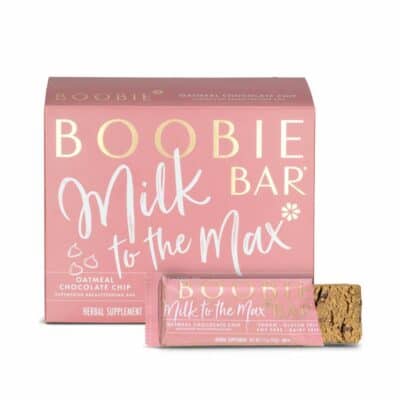
Editor’s Rating:
Quick Facts:
- Type: Bar
- Main Ingredient: Oats, Moringa, Lecithin
- Potential Side Effects: Potential Allergens
This unique blend of herbal ingredients and galactagogue foods makes these Boobie Bars stand out. They’re tasty and act as a well-rounded lactation supplement.
Ingredients
These oatmeal chocolate chip bars contain six lactation promoting ingredients. The most well-researched and effective ones are moringa leaves, lecithin, and oats. The other three include flaxseed, cinnamon, and shatavari.
While these last three are less well-researched in terms of their galactagogue abilities, they are packed with vitamins and minerals that will greatly improve the nutritional value of your breastmilk.
With this ingredient blend, these bars are an all-in-one supplement that boost production, prevent blocked milk ducts, and improve nutritional value.
Potential allergens include coconut.
How to Use It
Eat one bar daily, beginning 1-2 weeks after birth. When milk production becomes regular, you can cut back to half a bar per day.
The key drawback with these is that you get just six bars in a box, so you’ll run through multiple boxes each month. Unfortunately, they don’t offer any bulk buying options, so you just have to keep buying individual boxes.
If you’d prefer a lactation supplement that doesn’t require as much restocking but still offers similar convenience, you might try this lactation cookie mix.
Pros
- Lecithin prevents blocked milk ducts
- Fenugreek-free recipe has zero side effects
- Convenient for on-the-go moms
Cons
- Only 6 bars per box
- Contains potential allergens
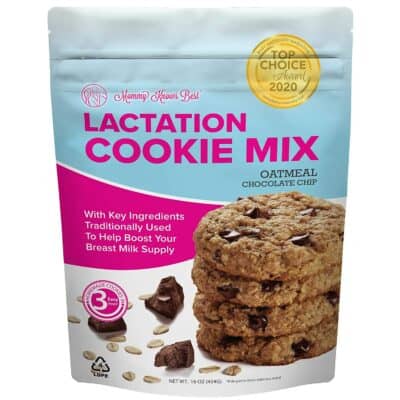
Editor’s Rating:
Quick Facts:
- Type: Cookie
- Main Ingredient: Lecithin, Oats
- Potential Side Effects: Potential Allergens
The cookies you’ll make from this mix are delicious and packed with vitamins and minerals that will make their way into your breastmilk, providing added nutrition to your baby’s diet.
Ingredients
The main lactation supporting ingredients in this recipe include lecithin and oats. It also uses brewer’s yeast, flaxseed, and cinnamon, which some claim can increase milk production, but there isn’t enough evidence to support those claims.
Still, the lecithin will help reduce the risk of blocked milk ducts, and the oats will help deliver more nutrients to your mammary glands, increasing the nutritional value of your breast milk.
For something with more potent and well-researched galactagogues, try these Benevolent Nourishment drops.
Potential allergens include dairy, soy, and wheat.
How to Use It
You can either prepare and bake the entire mix at once and then eat cookies as you go or make smaller batches at a time to enjoy fresher cookies. Once prepared, we recommend eating 1-2 cookies per day.
If you’re a baker, most of the ingredients in this cookie mix are things you likely already have on hand at home. The key galactagogue ingredient here is the oats. So it might be more cost-effective to just make your own lactation cookies. However, for those who don’t bake, this pre-made mix is certainly convenient.
For added lactation support, you might add a sprinkle of fenugreek or moringa leaves to the mix before baking.
Pros
- Delicious way to take a supplement
- Easy to prepare cookie mix
- Lecithin prevents blocked milk ducts
- Improves nutritional value of breast milk
Cons
- Cheaper to make this recipe from scratch
- Lacks more potent galactagogues
10. Milksta Organic & Vegan Nursing Coffee
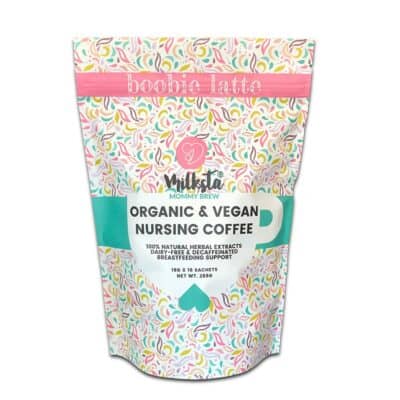
Editor’s Rating:
Quick Facts:
- Type: Beverage
- Main Ingredient: Moringa, Oats
- Potential Side Effects: Potential Allergens
This decaf coffee infused with moringa is perfect for moms who want to increase milk production but also have a coffee-craving they need to satisfy!
Ingredients
This is a decaf coffee blended with moringa powder, dehydrated vegetables, brewer’s yeast, oat creamer, and natural sweeteners. The result is a luxurious latte -like beverage that boasts powerful galactagogues, tons of vitamins and minerals, and zero caffeine.
Potential allergens include coconut and carrot.
How to Use It
To drink, stir the contents of one packet into a mug of hot water until dissolved. Enjoy! It’s a great way to get your daily dose of lactation supplement while also satisfying your craving for a cup of coffee!
One drawback is the single-serving packaging. While they are convenient to throw in your bag to take to work, they create a lot of waste.
Luckily, Milksta also offers the same recipe in a larger tub. This greatly reduces the amount of waste generated. It’s also more cost-effective per serving. So if you generally plan on drinking your decaf moringa coffee at home, we recommend opting for the tub instead of the bag of single-serving pouches.
Pros
- Easy to make
- Fenugreek-free formula has zero side effects
- Moringa helps increase milk production
- Decaf coffee satisfies craving without adding caffeine
Cons
- Wasteful packaging
- Contains potential allergens
Frequently Asked Questions About Lactation Supplements

In this section, we’ll answer some of the most common questions new mothers have about low milk supply and taking a lactation supplement.
What Ingredients Help Produce Breast Milk?
There are a few different natural ingredients that are commonly used to help improve milk production. The amount of research on their effectiveness is, unfortunately, often limited.
However, in this section, we’ll do our best to compile the latest and most reliable information on each of the active ingredients found in the list of lactation supplements above.
Fenugreek
Fenugreek is a potent galactagogue that’s found in most of the lactation supplements you’ll see on the market. It’s one of the most effective and most well-researched herbal galactagogue.
Some research suggests that fenugreek is most effective when you drink it rather than take it in capsule form. However, all methods of consumption have shown positive results.
Despite its popularity, you’ll also see a few brands touting their fenugreek-free formulas. The reason is that, while it’s safe, some people are sensitive to it, especially when taken in the high doses necessary to get the galactagogue effects. It can lead to nausea and decreased glucose levels in the mother and diarrhea in the baby.
None of these side effects are life-threatening, so it’s worth trying out a fenugreek lactation supplement to start. Just pay close attention to changes in your digestion and your baby’s stool for the first week or two.
If you notice any of these symptoms in yourself or your newborn, switch to a fenugreek-free formula like Sweetbottoms Moringa.
Moringa
Moringa has become an increasingly popular alternative for those who experience gastrointestinal discomfort from taking fenugreek. Only a couple of studies have been done, but they all suggest that it does have a noticeable effect on milk production.
In addition to being a natural galactagogue, moringa also contains a lot of vitamins, minerals, and amino acids. This makes it both a lactation and nutritional supplement, all in one ingredient.
There are also no known side effects to taking moringa, and it doesn’t seem to create any complications with other medications you might be taking. This lack of side effects and drug interactions are the key reasons why it’s becoming such a popular alternative to fenugreek.
Of course, you should still pay attention for signs of potential reactions even though there are no known side effects. This is especially important if you’re taking moringa in a blended formula with other ingredients that may come with their own side effects.
Milk Thistle and Blessed Thistle
Milk thistle is another popular galactagogue that has some scientific research to back it up. However, it isn’t absorbed well when taken orally so you may need higher doses to see an effect. This is why it’s more often found as one ingredient in a blend rather than as a standalone supplement.
Blessed thistle contains a few different compounds that may help increase milk supply. More research is needed before these claims can be verified.
It’s often found in blends with fenugreek and other galactagogues.
Both types of thistle are safe and mostly side effect free. However, those with allergies to plants in the ragweed family may experience an allergic reaction to thistle. The ragweed family includes:
- Melons
- Banana
- Zucchini
- Cucumber
- Artichoke
- Kiwi
- Chamomile
- Echinacea
- Daisies
If you are allergic to any of those, you should probably avoid supplements that contain blessed thistle.
Fennel
Fennel is not technically a galactagogue like the other herbal ingredients on this list. Instead, it contains oils like anethole and phytoestrogen which encourage your breasts to express. If your breasts feel full but you’re struggling to actually express the milk, fennel can help.
While there are no serious side effects to taking fennel, there is a potential for an allergic reaction if you are allergic celery, carrots, or other apiaceae family plants.
Lecithin
Like fennel, lecithin is also not a galactagogue. It’s a milk thinner. This is helpful if the problem you have isn’t the amount of milk, you’re producing but that it’s too thick or sticky to effectively express from your breast.
It’s a safe, natural ingredient that is derived most often from soybeans or egg yolks. If you find yourself regularly experiencing plugged milk ducts, a lecithin supplement like Legendary Milk can help.
Oats
While no research exists on whether oats act as a galactagogue of any kind, we do know that they improve your body’s ability to deliver nutrients to different parts of the body, including mammary glands.
So, oatmeal-based cookies like the ones you can make with this lactation cookie mix can increase the nutritional quality of your breastmilk by delivering more of those nutrients to your mammary glands.
A similar effect can be achieved by eating a bowl of oatmeal right after taking a capsule supplement. Since capsules sometimes have lower absorption rates, oatmeal can help offset that.
When Should I Start Taking Lactation Supplements?
You should wait at least five days after delivery to try a lactation supplement. This is because lactation doesn’t usually begin immediately after birth. Moreover, the amount of milk your body produces starts low and gradually increases over time. This is often in line with the nutritional needs of your newborn so it’s not necessarily a bad sign.
Before beginning lactation supplements, check for signs that you are, indeed, producing too little milk for your baby.
Signs of Low Milk Supply
It’s not easy to measure the exact amount of milk your baby is getting. Even if you could, you wouldn’t be able to tell the exact amount that they need. However, when babies aren’t eating enough, they tend to make that known.
Here are some signs that your baby may not be getting enough breastmilk:
Insufficient Weight Gain
Newborns will lose up to 10% of their bodyweight in the first few days after birth. So don’t panic immediately unless their weight loss is more than 10% of their starting weight. After the first week, babies start to gain a little under a ½ pound per week.
If your baby hasn’t started gaining any weight by day six, contact your doctor immediately. If it is a result of low milk supply, lactation supplements will help but using formula to supplement the shortage until you can get your production up to where it needs to be may also be necessary.
Too Few Dirty Diapers
If your baby isn’t pooping enough, they probably aren’t eating enough either. By month two, breastfed babies usually poop about four times per day. Formula-fed babies tend to poop less often.
If you’re using a combination of both, seeing only one or two bowel movements a day isn’t cause for concern.
Rather than measuring to a standard, just look for changes in your baby’s frequency. Are wet diapers lighter than they usually are? Are poopy diapers less frequent than they used to be? These might be signs of insufficient breast milk.
Symptoms of Dehydration
Babies rely on breastmilk for both hydration and nutrition. However, symptoms of dehydration often become noticeable sooner than symptoms of malnutrition. So, they’re useful symptoms to watch out for to make sure your baby is getting enough breastmilk.
Key symptoms to look for include:
- dark urine
- dry mouth
- lethargic behavior
- reluctance to nurse.
If your baby shows these symptoms, talk to your doctor right away to rule out illnesses or infections. If these symptoms aren’t the cause of an infection or illness, they may be the result of low milk supply.
False Signs of Low Milk Supply
As new parents, it’s easy to get worried about anything and everything. Any slight change can cause panic. If you’re worried about your milk production, there’s a pretty good chance this is just normal new parent panic. Here are some common issues that are perfectly normal but that new parents tend to mistake for signs of low milk supply:
Baby Wants to Nurse Too Often
In the first couple months, newborns tend to nurse between 8-12 times per day, including in the middle of the night. This is partially because they’re growing and need a lot of milk but also because they’re newborns and haven’t fully perfected the art of breastfeeding yet.
As stressful as it can be to breastfeed every two hours or so for months, this frequent nursing will also help stimulate your milk ducts and trigger more milk production.
Pumping also helps, and keeping bottles of breastmilk in the fridge can allow someone else to help with the feedings while you get some much-deserved rest.
Ideally, you want to start nursing before they launch into full-blown crying. Crying babies have a harder time latching.
Changes in Breast Firmness
If your breasts start to soften, you might mistake that for emptiness. However, as you continue to breastfeed, your breasts will naturally soften, even though they are still producing plenty of milk. By the time your breasts are fully producing, it’s normal for that initial firmness to go away.
Pumping After Feeding Yields Little Milk
Babies are more efficient at breastfeeding than you might give them credit for. If you’re pumping shortly after breastfeeding and getting nothing, it’s because your baby probably got most of it. Wait at least 1 ½ hours after nursing to pump.
Your Baby Is Fussy
Their diaper’s fresh. They’ve just had a good nap. They’ve just been nursed. Yet, they’re still fussing. Many new parents assume they must still be hungry. But some babies just fuss more than others.
If they don’t show any other signs of low milk supply, it’s likely not hunger. In fact, babies will also cry if they’ve been overfed. Bloated tummies aren’t comfortable, after all.
Before you jump to conclusions, rule out common causes of unexplained crying in newborns.
Your Breasts Aren’t Leaking Anymore
This doesn’t mean you’re producing less. It just means your nipples aren’t being falsely triggered to express anymore.
When you first start producing milk, leaking is common because any stimulation to the nipple can be mistaken for a “time to nurse” signal, and your breasts just haven’t fully figured out how to time milk release yet.
After a month or so, your breasts get better at the art of releasing milk at the right time, so leaks happen less. It has nothing to do with the quantity of milk being produced.
Even if you are producing plenty of milk, lactation supplements won’t hurt and can still improve the nutritional quality of your milk.
Supplements like Legendary Milk that are specifically designed to help with clogged milk ducts can also be good to have on hand, even if you’re producing enough milk. Clogs can happen, and they can also be painful.
What Causes Low Milk Supply?
If you’re struggling to produce enough milk, there could be a lot of different causes. In this section, we’ll look at some of the most common reasons for decreased milk supply:
Skipping Night Feedings
Some parenting books recommend sleep training methods that involve skipping those middle-of-the-night feedings. However, this can lead to a decrease in milk production. The decrease in breastfeeding time triggers hormonal changes in your body that tell it to produce less milk.
Basically, your body is designed to produce milk based on demand. The more you breastfeed, the more it produces. The less you breastfeed, the less it produces.
If you do want to sleep train your baby, you might consider pumping more often between feedings to maintain a sufficient milk supply.
Not Pumping Often Enough
When breasts are full, the milk ducts stop producing new milk. The longer you allow them to remain full, the longer your ducts go without producing new milk. As with skipping night feedings, this signals to your body that the demand for milk has decreased.
So it will start slowing production. On the other hand, when breasts are closer to empty, this triggers the milk ducts to start producing more to fill them again. Even if you have your baby on a feeding schedule, we recommend pumping in between feeding times to prevent your breasts from being full for too long.
Anti-Galactagogue Ingredients
Certain herbs can slow or even stop milk production. These are so effective, in fact, that these same herbs are usually recommended when you are ready to stop breastfeeding. However, until then, you should avoid them, that includes making sure you don’t cook with them.
Common ingredients in our diet that act as anti-galactagogues include:
- Sage
- Parsley
- Peppermint
- Oregano
- Thyme
Insufficient Glandular Tissue
For various reasons, some breasts don’t develop enough milk-producing ducts to meet their baby’s needs. Both pumping and breastfeeding will stimulate new growth so the solution here is to just keep at it. Supplements can help speed up that process, though.
Pre-Existing Conditions
Health issues including diabetes, hypertension, or thyroid problems can all affect hormonal regulation. Because hormones tell your body to produce milk, these conditions can cause low milk supply.
Typically, taking steps to treat or manage the pre-existing condition will usually resolve the low milk production as well.
However, certain medications aren’t safe to take while breastfeeding, which is when lactation supplements like Pure Mom come in handy.
Breast Surgery
Both medically necessary and cosmetic surgery can permanently damage milk ducts. The amount of damage caused depends on the surgery. If severe enough, even supplements may not be enough to generate enough milk supply, so you might need to use a combination of breast milk and formula.
Hormonal Birth Control
Having used hormonal birth control in the past will not influence milk production but using it while breastfeeding can. It doesn’t cause noticeable changes for everyone, though.
It’s most likely to cause low milk supply if you began the hormonal birth control in the first four months of your newborn’s life. To prevent this, consider sticking to nonhormonal birth control until you’ve finished breastfeeding.
Certain Medications
Certain medications, including many cold medicines, can prevent milk production. The list of medications you shouldn’t take while breastfeeding is too long to repeat here. Instead, we recommend checking with your doctor before starting any new medication, even over the counter medicine.
If you suffer from chronic issues like migraines, back pain, heart issues, or mental illness, talk with your doctor before you start breastfeeding to come up with a list of safe medications and treatment options to manage those chronic issues while breastfeeding.
Medications Used in Labor
If you got an epidural or Demerol during labor, this could temporarily decrease your baby’s ability to latch. Depending on how long the epidural was in or how much Demerol was used, these effects can last as long as a month.
In this case, it’s not actually a milk production issue. It’s your baby’s ability to latch. During that first month, it may be necessary to pump regularly and rely on bottles until your baby regains the ability to breastfeed effectively.
Other Convenient Products to Use While Breastfeeding
In addition to lactation supplements, you can also make the breastfeeding process easier and less painful with these other products:
- Nipple Creams. Regular breastfeeding can lead to chafing, soreness, and even bleeding. Nipple creams are designed to heal and soothe those symptoms without being dangerous for your baby.
- Bottles for Breastfed Babies. Keeping a couple bottles filled with breast milk can help new parents split the feeding responsibility better and prevent the nipple chafing and soreness that often comes with breastfeeding.
- Nursing Bras. Nursing bras are a must for comfort and convenience while breastfeeding.
- Nursing Pillows. These take some of the pressure off your arm when supporting your baby’s head while breastfeeding.
Final Word
Lactation supplements are a safe way to add a boost of vitamins to your breast milk, prevent blocked milk ducts, and increase total milk supply. Choosing the best formula for you comes down to which of those priorities is at the top of your list. Remember to also take any allergies or sensitivities you have into account!
